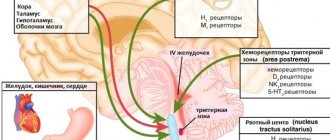Nausea after eating
Nausea is a feeling of heaviness in the pit of the stomach and throat, which can lead to vomiting.
If nausea is episodic and does not end with the evacuation of the stomach contents, then it can be attributed to various, completely harmless reasons. When this feeling haunts you regularly and becomes a constant companion, then the resulting concerns about your health are completely appropriate and should be shared with an experienced doctor.
Sudden nausea may be accompanied by additional symptoms
As for the reasons that provoke constant nausea, most often these are various diseases and disorders:
- diseases of the gastrointestinal tract, liver
- diseases of the gallbladder and bile ducts
- hypothyroidism
- helminthiasis (in common parlance - worms)
- some kidney diseases
- hypertension
- concussion
- problems with the vestibular system
- heart failure
- pregnancy (predominantly morning sickness)
- cancer
- AIDS
- constant stressful situations and nervous tension
- fasting or unbalanced diet
There are many causes of nausea.
As you can see, there are many causes of nausea and determining the cause of the ailment in each specific case is not so easy. Therefore, it is necessary to seek qualified help. Only a doctor, after assessing the general situation, taking into account test results and additional symptoms, can make the correct diagnosis and prescribe adequate treatment.
If nausea occurs after eating, this indicates diseases or malfunctions of the digestive system. This symptom can hide both harmless overeating and a serious illness that carries risks to life.
Nausea after eating indicates problems with the digestive system.
By the nature of the symptoms accompanying nausea, you can determine which organ is giving a signal about a problem. So, if pain begins while eating food, it can be assumed that there are diseases of the liver and gall bladder. They are accompanied by pain in the right side of the abdomen, under the ribs and a feeling of bitterness in the mouth.
If a pancreatic disease such as pancreatitis develops, then after a meal you will experience not only nausea, but also girdle pain. Both before and after eating, nausea occurs with hypothyroidism, when a significant decrease in appetite is felt, with active weight gain and frequent chills.
Nausea, loss of appetite, chills - symptoms of hypothyroidism
Nausea that occurs some time after eating food may indicate an intestinal infection. In this case, abdominal pain, loose stools, fever, and even possible vomiting will occur. Against this background, other symptoms of intoxication arise.
Nausea can lead to vomiting.
Nausea can also occur for more harmless reasons:
- binge eating
- eating food that tastes and smells unpleasant
- toxicosis during pregnancy (usually during and after breakfast)
- psychological disorders
- use of certain drugs
- vigorous physical activity after a heavy meal
When nausea is accompanied by sensations such as weakness and dizziness, the woman’s condition makes her think of serious illnesses, but such symptoms do not always indicate a critical state of health. Most often, these feelings overtake a woman during her period, and there is a scientific basis for this.
Nausea and dizziness are normal during menstruation
During menstruation, a woman’s body experiences fluctuations in hormone levels, which, in turn, can lead to a deterioration in well-being. In addition, menstruation is a small, but blood loss, which can cause minor anemia, which makes itself felt by dizziness, weakness and nausea.
Dizziness, slight weakness and morning sickness during pregnancy do not indicate pathologies. These symptoms are even one of the first signs of pregnancy. But if dizziness and weakness gradually flows into loss of consciousness, then you should not perceive this as a variant of the norm. After all, fainting against the background of the above symptoms may indicate low blood pressure, which is extremely dangerous for both the woman and the baby.
Pregnancy is often accompanied by dizziness and nausea
Nausea, dizziness and weakness can also result from:
- fasting or insufficient intake of vitamins and minerals due to an unbalanced diet
- rare walks in the fresh air, frequent stays in stuffy rooms
- fatigue, intense physical activity
- lack of sleep
- stress
Dizziness and nausea
Nausea and headaches most often occur in women; this has even become a topic for jokes among the people. But the causes of these symptoms are very serious, and some of them, if neglected, can lead to death.
Headache and nausea are dangerous symptoms.
In most cases, nausea and headache indicate diseases of the brain and nervous system as a whole. Also, the reason may lie in the psycho-emotional state of a woman if she is in a stressful situation or depressed. Among the diseases that can cause similar symptoms are:
- stroke
- concussion
- migraine
- brain tumor
- traumatic brain injury
- hypertension
- meningitis
- infection
If headaches and nausea are accompanied by a fever, your life may be at stake.
Diseases that are characterized by headaches combined with nausea are very dangerous and the sooner a woman seeks medical help, the more favorable the outcome and successful treatment will be. You must be very careful about your well-being, and if these symptoms are accompanied by fever or vomiting, you should immediately call an ambulance.
As a rule, many people associate lower back pain with problems of the spine, but if nausea and even vomiting occur along with this, then completely different diseases occur that arise in the internal organs. Most often, such symptoms occur in diseases of the genitourinary system, for example, urolithiasis.
Nausea and lower back pain
In addition, similar symptoms are characteristic of stomach ulcers, appendicitis and other diseases of the gastrointestinal tract. Only a doctor can accurately determine the cause of pain after a thorough examination.
In women, lower back pain and nausea may indicate diseases of the pelvic organs. In pregnant women, these signs often indicate a threat of miscarriage.
During menstruation, painful, uncomfortable sensations in the lower abdomen and nausea are a common phenomenon that is considered normal and no longer surprises anyone. But if pain and unpleasant sensations of nausea occur separately from menstruation, then you should seriously think about your health, and better yet, rush to the doctor without hesitation.
Lower abdominal pain and nausea
Diagnosis of the condition depends entirely on the accompanying symptoms, since abdominal pain and nausea themselves can indicate a huge number of different diseases. Moreover, one should not assume that these symptoms relate only to the organs of the reproductive system.
Lower abdominal pain and nausea may occur with:
- gastrointestinal diseases
- infectious diseases (they are usually accompanied by fever)
- problems of the urinary system (cystitis, pyelonephritis)
- endometriosis
- uterine fibroids
- oncological diseases
- ectopic pregnancy
Nausea and pain in the lower abdomen may indicate an ectopic pregnancy.
The occurrence of nausea in the evening and at night is specific to certain diseases, which can appear from time to time, developing into chronic ones, or be present constantly, moving into the acute phase.
Most often in the evening, the organs of the digestive system make themselves felt. This is especially likely if you had a heavy dinner or the food was too fatty. In addition, nausea may indicate the development of dyskinesia, appendicitis, and hypothyroidism.
Nausea in the evening
In the evening, blood circulation slows down, if the heart muscle is weakened, stagnation occurs, which is accompanied by nausea. This sensation also occurs with neurological diseases, psychological disorders against the background of a stressful situation.
A feeling of nausea in an older woman, accompanied by other symptoms, can occur for a variety of reasons. As a rule, at this age the body is susceptible to a large number of diseases, among which the most common are diseases of the digestive organs, heart, and neurological disorders.
Nausea in older people occurs for many reasons
Nausea in older women can occur due to severe pancreatitis, intoxication, diabetes, cancer, stroke, or due to minor malfunctions in the functioning of internal organs or poor diet and daily routine.
Unfortunately, sooner or later a woman ages, and menopause is considered one of the signs of this process entering the active phase. Most young women fear it like fire, while others accept it with resignation, but one of the symptoms of menopause - nausea - remains unacceptable and unpleasant for everyone.
Nausea during menopause
The main female hormone, which is called estrogen, begins to be produced in reduced quantities during menopause. In this regard, changes occur in the body as a whole and at the level of each organ system separately. A change in hormonal levels is a stressful situation for a woman’s body, and it lets you know about it with specific reactions.
Nausea is an unpleasant and painful symptom, and whatever its cause, you should not put up with it or endure it. Share your feelings and experiences with specialists and let them change your life for the better by eliminating the cause and unpleasant feeling of nausea.
Brain nausea
Useful video
During evolution, nature has provided many reflexes, and the main ones are present not only in humans.
Vomiting in the animal world can also have a natural character, if in this way specific stomach contents are usually removed.
In a person, no matter an adult or a child, this is a protective mechanism that works on a subconscious level and is designed to remove substances or products that have a toxic effect from the body.
Studying the ejected contents of the stomach can give an idea of the nature of the pathology and the degree of its development, because it is not always just the remains of undigested food.
Vomit may contain blood, bile, sometimes even the contents of the rectum and, depending on foreign impurities, take on the uncharacteristic color of coffee grounds, yellow, green, red or white.
The vomit may be colored the color of food eaten or a drink drunk that contains a persistent dye.
As an independent manifestation, it is rare; nausea is usually its frequent companion; sometimes diarrhea, abdominal pain, fever, dizziness, sticky cold sweat, weakness and headaches appear in parallel.
Vomiting is always a symptom of poisoning or severe intoxication, and the body gets rid of negative substances to prevent further consequences.
Nausea for a long time, why do you feel nauseous and feel sick in the evening?
Nausea in the evening
It is important to remember that if nausea lasts a long time and its intensity does not decrease, then this may be one of the signs of a person’s pre-infarction state. Other symptoms are added to this feeling: the skin turns pale, the person feels stuffy, pain in the heart area and radiates to the arm. In this case, you need to urgently call an ambulance, as this can lead to serious complications.
If nausea is accompanied by pain in the upper right part of the abdomen, and a temperature appears, then you should pay attention to appendicitis. Perhaps severe inflammation has begun. In this case, urgent hospitalization will be required. It is necessary to understand that constant nausea is not good and consultation with a specialist is required.
Sometimes it happens that completely healthy people can suddenly feel a sharp headache accompanied by nausea. This can happen, for example, when you have to work for a long time in an uncomfortable position (at a computer, etc.).
Gradually, numbness occurs in the shoulders and neck, pain in the back of the head appears, and nausea begins. The reasons, if there is no pregnancy, therefore lie in the wrong position of the body.
If you have vision problems and wear glasses, choosing them incorrectly can cause periodic headaches and nausea. A fairly common disease of our time - osteochondrosis - can also cause dizziness.
Our life is so full of all kinds of stress and worries from everyday problems that this leads to a lack or excess of oxygen in the blood. This may cause nausea. There are obvious reasons other than pregnancy, but they are of a completely different nature.
Headaches that appear at different times of the day may be the result of head injuries leading to increased intracranial pressure.
Many women are perplexed: there is no pregnancy, but they feel sick. The reasons may lie in a disease such as migraine. In this case, paroxysmal headaches appear, which are not always relieved by painkillers.
Some people suffering from hypertension also note that high blood pressure can cause not only headaches, but also nausea. The reasons, if without pregnancy, lie in arterial hypertension.
Nature and causes of vomiting
Before you try to stop vomiting on your own, you need to determine the cause, as some cases require immediate medical attention. The nature and color of the secreted vomit varies and is directly related to the factor that caused it.
Vomiting with mucus
If mucus is found in the vomit, this may indicate the following pathological conditions:
- inflammation of the gastric mucosa as a result of taking medications or irritating foods;
- exacerbation of gastritis due to non-compliance with the diet;
- damage by a viral infection (influenza, rotavirus, etc.);
- diseases of the central nervous system;
- food poisoning.
Vomiting with mucus is often observed in infants and is considered normal. It usually occurs immediately after feeding if the baby has eaten too much. This type of vomiting is due to the fact that during regurgitation due to stomach overfilling, mucus from the nasopharynx can get into the vomit.
Vomiting with traces of blood
The presence of blood in the vomit is a possible symptom of internal bleeding in the digestive tract. The color of the vomit can vary from bright red to coffee brown. A scarlet color indicates bleeding in the mouth, esophagus, or upper stomach. Brown or coffee-colored vomit is a sign of bleeding in the lower part of the stomach and duodenum. Vomiting with traces of blood can be caused by:
- the presence of ulcers or erosions in the stomach or duodenum;
- entry of foreign bodies into the gastrointestinal tract;
- poisoning by poisonous mushrooms or chemicals;
The appearance of vomiting with traces of blood in a baby may be due to the ingress of mother’s blood into the gastrointestinal tract from cracks in the nipples during feeding
Important: Vomiting with blood is an indication for immediate hospitalization!
Vomiting bile
Vomit mixed with bile is yellow-green in color and has a bitter taste. It can be observed with the following abnormalities in the body:
- bile reflux;
- intoxication with alcohol, low-quality products, etc.;
- exacerbation of chronic diseases of the liver, gall bladder and biliary tract after eating fried, fatty or spicy foods;
- binge eating;
- nervous stress and disorders in the central nervous system.
How to get rid of an attack of nausea
Some people feel quite healthy during the day, but at night they feel sick, but not from pregnancy. What reasons can provoke such an attack? During sleep, we are in the same position for a long time, the work of all organs slows down at this time, discomfort, if any, begins to accumulate, and you wake up with a strong feeling of nausea.
This is only possible in the case of pathological changes, so your body gives you a signal that it’s time to pay attention to your health.
Problems with the thyroid gland can also disturb you at night, not to mention diseases of the cardiovascular system, for example, hypertension or vegetative-vascular dystonia.
Do not leave such conditions unattended; any disease is easier to treat at the initial stage!
When nausea occurs, the reasons, if not pregnant, can be different. But no matter what they are, I really want to get rid of this condition as soon as possible! Here's what doctors recommend:
- Try to eat a little, food will stabilize the frequency of contractions of the stomach walls and the condition may improve.
- Drink a sweet drink, but do not drink too hot or cold liquid, or milk. It provokes the fermentation process.
- Take an antiemetic drug.
- Breathe frequently and deeply, especially if the attack is caused by stress.
- If this condition is caused by taking medications, then you need to choose another drug.
- Try applying a compress with lavender, chamomile or clove oil to your stomach. It will calm your stomach and the nausea will subside.
- During such an exacerbation, do not eat fatty foods. Try to drink more fluids, eat often, but in small portions.
Even if you managed to cope with an attack of dizziness and dizziness, you still should not put off visiting a doctor. You need to determine the cause of your problem in order to fix it.
Morning problems
Do you often experience nausea in the morning? Reasons other than pregnancy can be different, for example:
- The presence of parasites in your body. Helminths poison us with their waste products, which often causes nausea, abdominal pain, weight loss, and decreased appetite.
- Gastrointestinal diseases. There are many organs in the digestive system, but they do only one job. Problems in one of them can provoke discomfort, heartburn, nausea and vomiting.
- Problems with the liver and kidneys.
- Vegetovascular dystonia. Often it is the cause of dizziness, nausea, and headaches in adolescents.
- Hypertension.
- Problems with the vestibular system. In this case, sudden movements and turns of the head can provoke an attack.
- Medicines. When taking certain medications, you may experience bouts of vomiting, headaches, and discomfort in the epigastric region as side effects.
Do you often feel nauseous in the morning? If there is no pregnancy, the reasons may be the most unexpected. In each specific case, a doctor’s consultation and a thorough examination are necessary.
Treatment
If you are bothered by nausea in the evenings, the condition can be alleviated with the help of medications or folk remedies.
For food or alcohol poisoning - aeron, anesthesin, validol. It is very effective due to its menthol content.
We must try to quickly stop the poisoning with the help of Stop-Diar, Enterofuril, Cerucal.
Attention! Before using medications for chronic diseases, consult a doctor.
When undergoing chemotherapy, the pills are prescribed by the doctor, usually Zofran or Ativan. For pregnant women struggling with toxicosis, Hofitol, Kokkulin, Bonin are recommended.
If there are problems with the gastrointestinal tract, take Furazolidone, Duspatalin, Gimecromon, Motilium, Passazhix.
Home remedies that are great are green tea, mint tea, ginger, baking soda solution, lemon, and dill seed infusion.
The nervous system is the culprit of nausea
Many women wonder: they feel sick, but are not pregnant, what other reasons could there be? The vomiting center is located in the brain, so problems with the nervous system can often be the culprit for the occurrence of such attacks.
If you have constantly increased intracranial pressure, this can provoke nausea and vomiting, as the brain is compressed.
When a tumor appears, this condition first begins to bother you periodically, and as it grows, such attacks become more frequent, the person constantly feels dizzy, and the person may even lose consciousness. In this case, urgent hospitalization is necessary for examination.
Infectious diseases, for example, meningitis, Lyme disease, AIDS, syphilis, are often accompanied by vomiting and nausea.
Seasickness, the cause of which lies in the insufficient functioning of the vestibular apparatus, also provokes motion sickness, especially with sudden movements and turns. You should not brush aside such problems; you should contact a neurologist.
Useful video
Vomiting is an involuntary act in which, as a result of contraction of the muscles of the abdominal wall and diaphragm and a decrease in the tone of the muscles of the fundus of the stomach, its contents are quickly thrown down the esophagus into the oral cavity. This phenomenon, as a rule, is always preceded by a feeling of nausea, increased salivation, a change in breathing rhythm and increased heart rate. Vomiting is a mechanism for cleansing the body in case of poisoning, overeating, or infection.
A vomiting attack can also occur against the background of diseases of the digestive system and nervous system. The appearance of this symptom should be treated responsibly and seek help from specialists, especially if it recurs many times within one day or periodically over several days. Based on an analysis of the composition of vomit, its color, consistency and conditions of occurrence, you can obtain information about the cause that caused it and, depending on this, decide what to do when vomiting in each specific situation.











